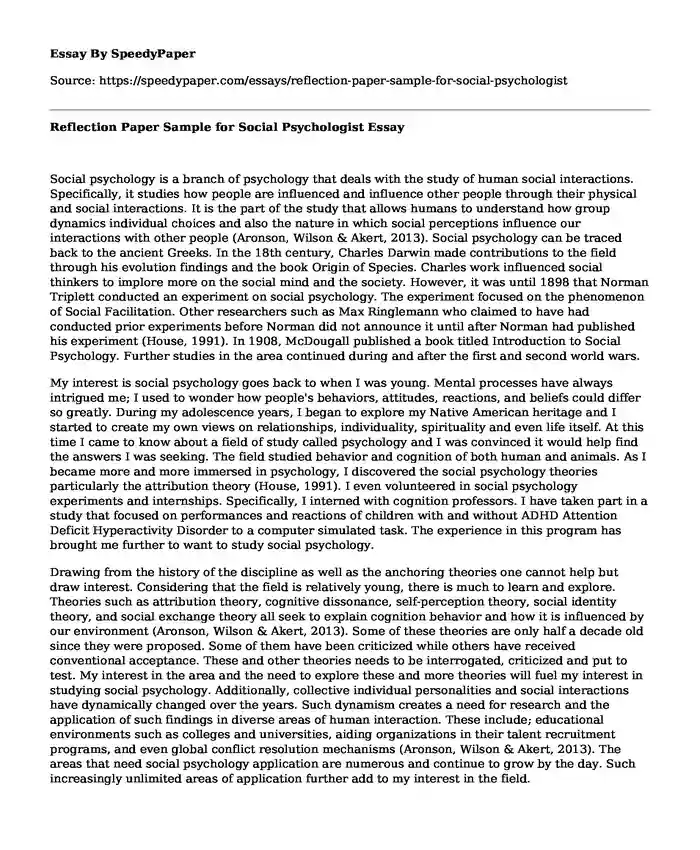
| Type of paper: | Essay |
| Categories: | Social psychology |
| Pages: | 3 |
| Wordcount: | 627 words |
Social psychology is a branch of psychology that deals with the study of human social interactions. Specifically, it studies how people are influenced and influence other people through their physical and social interactions. It is the part of the study that allows humans to understand how group dynamics individual choices and also the nature in which social perceptions influence our interactions with other people (Aronson, Wilson & Akert, 2013). Social psychology can be traced back to the ancient Greeks. In the 18th century, Charles Darwin made contributions to the field through his evolution findings and the book Origin of Species. Charles work influenced social thinkers to implore more on the social mind and the society. However, it was until 1898 that Norman Triplett conducted an experiment on social psychology. The experiment focused on the phenomenon of Social Facilitation. Other researchers such as Max Ringlemann who claimed to have had conducted prior experiments before Norman did not announce it until after Norman had published his experiment (House, 1991). In 1908, McDougall published a book titled Introduction to Social Psychology. Further studies in the area continued during and after the first and second world wars.
My interest is social psychology goes back to when I was young. Mental processes have always intrigued me; I used to wonder how people's behaviors, attitudes, reactions, and beliefs could differ so greatly. During my adolescence years, I began to explore my Native American heritage and I started to create my own views on relationships, individuality, spirituality and even life itself. At this time I came to know about a field of study called psychology and I was convinced it would help find the answers I was seeking. The field studied behavior and cognition of both human and animals. As I became more and more immersed in psychology, I discovered the social psychology theories particularly the attribution theory (House, 1991). I even volunteered in social psychology experiments and internships. Specifically, I interned with cognition professors. I have taken part in a study that focused on performances and reactions of children with and without ADHD Attention Deficit Hyperactivity Disorder to a computer simulated task. The experience in this program has brought me further to want to study social psychology.
Drawing from the history of the discipline as well as the anchoring theories one cannot help but draw interest. Considering that the field is relatively young, there is much to learn and explore. Theories such as attribution theory, cognitive dissonance, self-perception theory, social identity theory, and social exchange theory all seek to explain cognition behavior and how it is influenced by our environment (Aronson, Wilson & Akert, 2013). Some of these theories are only half a decade old since they were proposed. Some of them have been criticized while others have received conventional acceptance. These and other theories needs to be interrogated, criticized and put to test. My interest in the area and the need to explore these and more theories will fuel my interest in studying social psychology. Additionally, collective individual personalities and social interactions have dynamically changed over the years. Such dynamism creates a need for research and the application of such findings in diverse areas of human interaction. These include; educational environments such as colleges and universities, aiding organizations in their talent recruitment programs, and even global conflict resolution mechanisms (Aronson, Wilson & Akert, 2013). The areas that need social psychology application are numerous and continue to grow by the day. Such increasingly unlimited areas of application further add to my interest in the field.
References
Aronson, E., Wilson, T. D., & Akert, R. M. (2013). Social psychology (8th ed.). Upper SaddleRiver, NJ: Pearson.
House, J. S. (1991). Sociology, Psychology and Social Psychology (and Social Science). Recent Research in Psychology The Future of Social Psychology, 45-60. doi:10.1007/978-1-4612-3120-2_4
Cite this page
Reflection Paper Sample for Social Psychologist. (2022, Jun 16). Retrieved from https://speedypaper.com/essays/reflection-paper-sample-for-social-psychologist
Request Removal
If you are the original author of this essay and no longer wish to have it published on the SpeedyPaper website, please click below to request its removal:
- Free Example of Rhetorical Analysis Assignment
- Essay Example on the Mars Phoenix Lander Mission
- Free Essay Sample on The DNA Article by Tim Newman
- Free Business Essay Examples
- Report on Having Full-Time Workers
- Paper Example on Rebuilding a Nation After the Haiti Earthquake Disaster
- Navigating Learning Disabilities: Unveiling Frustration, Anxiety, and Tension in Education - Essay Sample
Popular categories




